 APRIL, 2024. This graduate
student completed the majority
of the requirements to obtain
honors, which included a 4.0 GPA,
published works, recommendation
from advisors, patent a
product, etc. Congratulations!
APRIL, 2024. This graduate
student completed the majority
of the requirements to obtain
honors, which included a 4.0 GPA,
published works, recommendation
from advisors, patent a
product, etc. Congratulations! MARCH 22, 2024. An article
was published today
online by Mohammad
Shahidul Islam in Current
Trends in Engineering
Science (CTES), USA.
Link to the published article
“Strength, Weakness, Opportunity
and Threat (SWOT) Analysis of
BUET Chemical Engineering Education
in Home and Abroad” is:
https://www.corpuspublishers.com/assets/
articles/ctes-v4-24-1056.pdf
Abstract: Bangladesh
University of Engineering &
Technology (BUET)’s Chemical
Engineering Department
is almost 75 years old. This
department has one the
world’s best Chemical Engineering
curriculums to teach enrolled bright students
of the country. As result,
the students can grab the
teaching materials easily
to educate themselves.
Despite this, the graduates face
many challenges to establish
themselves in home and
abroad. Competitive curriculum
and personal competency are
the strength. Lack of quality
facility and resources are the
weakness. Innovative quality
and devotion in profession are
the opportunity. ...
Mohammad Shahidul Islam
is an AIU Advisor and graduated
Atlantic International
University from a Doctorate
program with a major in
Chemical Engineering.
MARCH 22, 2024. An article
was published today
online by Mohammad
Shahidul Islam in Current
Trends in Engineering
Science (CTES), USA.
Link to the published article
“Strength, Weakness, Opportunity
and Threat (SWOT) Analysis of
BUET Chemical Engineering Education
in Home and Abroad” is:
https://www.corpuspublishers.com/assets/
articles/ctes-v4-24-1056.pdf
Abstract: Bangladesh
University of Engineering &
Technology (BUET)’s Chemical
Engineering Department
is almost 75 years old. This
department has one the
world’s best Chemical Engineering
curriculums to teach enrolled bright students
of the country. As result,
the students can grab the
teaching materials easily
to educate themselves.
Despite this, the graduates face
many challenges to establish
themselves in home and
abroad. Competitive curriculum
and personal competency are
the strength. Lack of quality
facility and resources are the
weakness. Innovative quality
and devotion in profession are
the opportunity. ...
Mohammad Shahidul Islam
is an AIU Advisor and graduated
Atlantic International
University from a Doctorate
program with a major in
Chemical Engineering.
 Call for Papers
This Conference will be held
25–29 April 2025
hosted by National Changhua
University of Education,
Changhua City, Taiwan.
We invite proposals for paper
presentations, workshops/
interactive sessions, posters/
exhibits, colloquia, focused
discussions, innovation showcases,
virtual posters, or virtual
lightning talks.
Call for Papers
This Conference will be held
25–29 April 2025
hosted by National Changhua
University of Education,
Changhua City, Taiwan.
We invite proposals for paper
presentations, workshops/
interactive sessions, posters/
exhibits, colloquia, focused
discussions, innovation showcases,
virtual posters, or virtual
lightning talks. APRIL, 2024. This graduate students completed their program with a high cumulative grade point
average, which reflects the quality of performance within their respective major. Congratulations!
APRIL, 2024. This graduate students completed their program with a high cumulative grade point
average, which reflects the quality of performance within their respective major. Congratulations!

| Ivany Neto Carlos Bachelor of Business and Economics Accounting Angola |
Moya Modise Doctor of Education Curriculum and Evaluation Botswana |
Bambara Thibaut Master of Science Public Health Burundi |
Khy Phearun Doctor of Philosop hy Educational Technology Cambodia |
Nanfa Simon Doctor of Science Health Care Management Cameroon |
Israr Waheed Doctor of Philosop hy Maritime Management Canada |
| Kieran Oliver Finch Bachelor of Science Mechanical Engineering Cayman Islands |
Hector Erazo Ospina Bachelor of Science Civil Engineering Colombia |
Julio C. Reyes Hiraldo Bachelor of Project Management Development of New Projects Dominican Republic |
Paul Antonio Anchundia Bastidas Doctor of Philosop hy Org. Agri.: Plant Oxo-Hydrothermal Reg. Ecuador |
Cindy Yajaira Rodriguez de Rivas Bachelor of Science Nutrition and Dietetics El Salvador |
Edith Flore Djoumele Bachelor of Education Educative Administration and Supervision Equatorial Guinea |
| Mark Obeng Andoh Doctor of Theology Theology Ghana |
Kwame Osei-Bonsu Master of Accounting International Taxation Ghana |
Ida Adjoa Asiedu Bachelor of Science Business Communication Ghana |
Pedro Luis Tavarez Maria Bachelor of Science Civil Engineering Italy |
Saul Davis Sango Master of Psychology Industrial and Organizational Psychology Kenya |
Nathan Nyamao Bachelor of Science Mechanical Engineering Kenya |
| Philip Kamau Manyara Bachelor of Science Business Information Technology Kenya |
Daniel Sandoval Ocampo Doctor of Science Nutrition Mexico |
Odete Moises Cossa Doctor of Science Public Health Mozambique |
Juan Jose Montoya Perez Master of Legal Studies Criminal and Civil Legal Studies Nicaragua |
Adenekan Aminat Omonike Bachelor of Science Food Science Nigeria |
Oluwole Muyiwa Smile Doctor of Healthcare Administration Health Economics Nigeria |
| Ahmed Gimba Bello Doctor of Science Economics Nigeria |
Simon Urakowi Ugi Doctor of Philosop hy Educational Leadership Pap ua New Guinea |
Claude Phiri Bachelor of Science Accounting and Financial Management South Africa |
Marius Florin Vlad Doctor of Education Education Spain |
Guven Icoz Graduate with Distinction Doctor of Science Security and Strategic Studies Türkiye |
Wilfred Opio Wanyama Doctor of Business Administration Marketing Uganda |
| Dr. Zelda Hill Doctor of Philosop hy Music Education United Kingdom |
Babatunde Olusakin Olorunfemi Doctor of Business Administration Business Management United Kingdom |
Abdulganiyu Olayiwola Salako Doctor of Philosop hy Geomechanics USA |
Sarah J. Loudy Doctor of Philosop hy Sport Science and Nutrition USA |

 Carol Jannette PER
Carol Jannette PER  Sarah Loudy
Sarah Loudy 
When talking about benefits,
many immediately
think of the economic aspect.
The benefit of something is not
only an economic aspect, it’s
also a quality of life aspect.
Quality of life refers to having
the opportunity to grow as
a human being, receiving the
benefits corresponding to Human
Rights from the State.
As for learning, it’s being
able to identify an object, which
can be physical or ideal, and the
characteristics it has. Learning can be informal and
formal. Informal learning
is what we obtain through the
experience we acquire in living
with others. Formal learning
is what science provides
us. For formal learning we
need to be guided in the methods
that science must achieve
knowledge of objects.
In formal learning we currently
have serious problems
because the States, which
oversee organizing education,
in many cases, change the social
sciences for ideologies that
suit their interests to remain
in power. We also have the
problem that many citizens are
made to think that education,
learning, is beneficial for a few.
Another difficulty is the
implementation that the States
do so that all citizens can have
quality education.
We know that there are
Psychological and Pedagogical
methods so that students
can achieve the knowledge that
today’s society demands.
The implementation and
training of knowledge accompaniers
is something that many
States don’t do because they
save the money for other activities
that suit their interests.
Human Rights are rights of
all human beings and due to
their ignorance, many people
are used for the benefit of certain
rulers.
There are 30 Human Rights
and States are obliged to provide
them to all beings in the
society they represent.
The State is not for the
benefit of certain groups. “…
it is said that the State, as a
human work, has been built to
serve social, that is, collective,
purposes of all the members
of a society…” National Autonomous
University of Mexico- UNAM . Legal
Archives- p. 46-47. https://archivos.
juridicas.unam.mx/www/bjv/libros/
3/1461/5.pdf
The State arises to organize
everyone in a coexistence of
opportunities for all. In the
times in which we live, groups
of human beings have appropriated
the functions of the
State to only look after their
economic well-being.
Education and Quality
Education is a Right for every
human being. From the legal point of view “...it is stated
that the State is a legal person
formed by a political community,
settled in a determined
territory and sovereignly organized
in its own government
with decision and action.”
National Autonomous University of Mexico-
UNAM . Legal Archives- p. 46 https://
archivos.juridicas.unam.mx/www/bjv/
libros/3/1461/5.pdf
The State is not an entity
that emerged from the taste of
anyone: it means the coexistence
and organization of
human beings and the opportunity
to be had and treated
with all the benefits and rights
as a human being.
“Education is a human
right. The right to education
is enshrined in article 26 of
the Universal Declaration of
Human Rights. The declaration
calls for free primary education
and mandatory. The Convention
on the Rights of the Child,
adopted in 1989, goes further
by stipulating that countries
must make higher education
accessible to all.” United Nations. International Education Day. january 24.
https://www.un.org/es/observances/
education-day
Let’s see what Human Rights
are because many people, due
to their lack of knowledge,
are deceived by the States that
claim to give privileges to citizens
and what they do is give
what is their obligation and
maintain the discourse that
they are wonderful for everything.
What they do when it is
their obligation.
Universal Declaration
of Human Rights
All human beings are born
free and equal.
All people have all the rights
of this Declaration.
Every person has the right:
To the life.
No one may be subjected to
slavery.
No one will be subjected to
torture.
Every person: has the right
to be recognized in his or her
personality.
It is equal before the law.
They have the right to effective
recourse before the law.
No one can be arbitrarily
detained.
Everyone has the right to be
heard publicly:
He or her has the right to be
presumed innocent.
No one will be subject to
interference in her private life.
You have the right to:
Move freely.
To seek asylum.
To a nationality.
To find a family.
To private and collective
property.
To freedom of thought.
To the expression freedom.
To freedom of assembly.
To participate in the government
of your country.
To social security.
To work.
To rest.
To social services.
To education.
To cultural life.
For Human Rights to be
made effective.
Has duties to the community.
Nothing in the Declaration
of Human Rights can be
interpreted differently. United
Nations. Peace, Dignity and Equality on a healthy planet.
https://www.un.org/es/about-us/universal-
declaration-of-human-rights
We may ask ourselves by
what means we can make
everyone aware of their rights
as human beings. The best
instrument is education.
“Education is key to sustainable
development. When the
2030 Agenda for Sustainable
Development was adopted,
the international community
recognized that education is
essential to the success of
its 17 goals. Goal number 4
of Sustainable Development
specifically aims to ‘ensure
inclusive and equitable quality
education and promote
lifelong learning opportunities
for all’ by the year 2030.”
https://www.un.org/es/observances/
education-day Education is so important
that the World Bank committed
to helping achieve goal 4 of the
Sustainable Development Goals
SDG 4. Without a people, a Nation
without Education we can
achieve little.
The World Bank committed
to helping achieve the Sustainable
Development Goal – SDG
4, which works for equitable,
inclusive, and quality education.
World Bank. Press release. 2024,
04. https://www.worldbank.org/es/
topic/education/overview
We are living in a world
that seems unknown to us: an
abundance of science, but also
hate speech. What is happening
to human beings? Will the
human species disappear along
this path?
The human species will not
disappear because we were born
to build. Human beings, by our
nature, need others to grow, to
learn. If we were as a society
building the path to disappear,
we would have already done so
many centuries ago.
We are living a stage of great experience, some would say,
to learn the value we have. At
these moments in History, we
are witnessing a few who could
not have had more hate speech
and misinformation. We will
learn to value who we are and
how much we can grow.
It seems that the other one
doesn’t exist. We must learn
the value of the other, the ways
of coexistence.
We must learn, we must
study to know where we are
going, to understand the way
of being with others.
You are studying and studying
should be to grow and to
give to others. You do your
program at Atlantic International
University (AIU):
Study and you will grow.
Give to others
so you can be happy.
Only in this way we will
all live growing.
Only this way we will
live in peace.
BIBLIOGRAPHY. Banco Mundial. Comunicado de Prensa. 2024.
04. https://www.bancomundial.org/es/topic/education/overview | Naciones
Unidas. Día Internacional de la Educación. 2024. enero 24. https://
www.un.org/es/observances/education-day | Organización de las Naciones
Unidas. Paz, Dignidad e Igualdad en un planeta sano. https://www.
un.org/es/about-us/universal-declaration-of-human-rights | Universidad
Nacional Autónoma de México - UNAM. Archivos jurídicos- p. 46-
47. https://archivos.juridicas.unam.mx/www/bjv/libros/3/1461/5.pdf | Universidad
Nacional Autónoma de México - UNAM. Archivos jurídicosp.
46. https://archivos.juridicas.unam.mx/www/bjv/libros/3/1461/5.pdf

I. Introduction
This study employed pragmatic
world view coupled with
mixed methodology design
and research approach (Creswell,
2014). The main focus was on
how the eucalyptus tree species
impact ground water depletion.
As the survey process
progressed, it was noted that,
a paradigm shift is needed in
groundwater management,
from technocratic approaches
to use of collaborative, participatory
knowledge systems.
Groundwater users, technical
specialists, scientists and
policy makers need to work
jointly with the support of
facilitators, and backed by
demonstration results, learning
and communications.
They should collaborate to
align groundwater knowledge,
governance reforms, economic
incentives, investment and
social organisation. Smith
(2016), associates the tree’s
fast growth, adaptability to a
wide range of environments and socio-economic roles it
plays to its global support
it has gained. Since 1980’s
International Monetary Fund
(IMF) promoted tree plantations.
In compliance to IMF’s
call most countries worldwide
adapted to establishing plantations
with the earth covered
by forestry plantations which
increased from 167 million to
277.9 million hectares from
1990 to 2015. Brazil, Argentina
and Chile comprise the largest
areas of forestry plantations in
South America. Currently Brazil
has about 7.8 million hectares
of planted forests, mainly eucalyptus
(5.7 million hectares)
and pinus (1,6) (Tiago Souza Mattos,
2019). As for the African region,
forestry plantations were earmarked
to meet increased demand
for domestic industries,
export, fuel wood and charcoal,
together with the demand for
an array of non-wood products.
Pressure has been exerted
on natural forests as a result
of urbanisation and above all human population growth. As
such production levels are; 1.76
million in W. Africa, 0.15 in E.
Africa, 0.05 in C. Africa and
2.2 million in Southern Africa
(Chamshama and Nwonw u, 2004). While
the above production levels
were mainly inclined to meet
economic targets, plantation
forests could play ecological
roles in buffering floods,
increasing interception rates,
decreasing surface runoff as
well as contributing to an
accumulation of soil organic
matter (Bonn esoeur etal, 2019).
The purpose of this study
is to alert farmers on the
controversial impact paused
by the eucalyptus tree species
on ground water depletion, a
phenomenon that seemed to
be silent among the group of
people and has led to diverting
of the cropping programmes on
certain lands as well as shifting
farmers from old farming sites
relocating themselves to new
sites of favourable conditions.
Targeted farmers in question
seem to be a neglected group
by most studies because of
their farmland sizes and location
(Subsistence farmers).
Most studies concentrated on
big forestry plantations ignoring
small forestry tree establishments
(less than 1 hectare
plantations).
Water depletion on ground
water sources was mainly
attributed to climate change,
putting very little blame on
other factors if not none at
all except for experts in the
area of hydrological studies.
The study will demystify the
dilemma of only associating
ground water shortage to poor
precipitation. Inclusion of this minority group in the study
closes the gap left by most
researchers.
Various studies based on
forestry tree plantation concentrated
much on the production
side with less input on
expatiating the negative impact
paused by such plants in particular
the eucalyptus species.
Timberwatch Coalition and
World Rainforest Movement
(2016) concentrated on projects
earmarked at exploiting all
African patches with a potential
to produce timber and to
include countries falling within
West, East, Central and Southern
Africa. White etal (2916)
consider eucalyptus as contributing
to positive development
through retention of soil in its
natural state as well as providing
wood-based products.
Negatively however, note the
trees as impacting the availability
of underground water
levels by excessively drawing
it than what the soil should
retain. Studies by Rotzer etal
(2016) view forest trees as
natural water balancing bodies
regulated by climatic conditions
variation in which losses
can be restricted through stoma
closure or emitted as stoma
open and thus maintaining an
uncompromised water balance.
This Scientific view is
shared with that of Braun etal
(2004) where ground water
levels are naturally regulated contributed much to the tree’s
loss of credibility which is the
nerve centre of this study. This
implies that continuous production
of the tree species in
drought threated regions would
render the people into great
food security risks.
II. Study methodology
This study specifically
used exploratory sequential
mixed method approach
where the researcher began
with a qualitative research
phase in exploring the views
of 24 farmers selected from 52
Ward 20 villages of Cikomba
District in the Mashonaland
East province -Zimbabwe...
The data was then analyzed,
and the information used to
build into a second, quantitative
phase. The qualitative
phase was used to construct
the questionnaire instrument
that best fits the sample under
study (Creswell, 2014). The study
used 3 ponds as a 3-year case
study after prior observation
of some water level changes
in ponds and other areas that
used to be marshy at certain
times of the year but have
totally changed as nearby eucalyptus
tree canopy increased.
The questionnaire contained
the purpose of planting the
tree, justification on the choice
of the site; awareness on how
the tree could impact ground
water sources levels and views on action to take in getting rid
of wrongly sited plantations.
Concurrently observations were
made to determine how the
tree species impacted ground
water levels. Questionnaire
contents were schematised.
III. Results
and discussion
With reference to Table 1,
33.3% the respondents planted
trees around their cropping
areas irregardless of where
the farmland was situated and
could not have been aware on
how the trees could impact
crop productivity which the
trees later did as their canopies
increased. 29% of the respondents
aimed at establishing
timber for general home
use and tree establishment
to them had to be anywhere
as long as they managed to
get timber for the intended
purpose. 25% of those utilising
idle land were also not site
restrictive as they were targeting
at open spaces. Draining
excess water by 12.5% of the
respondents was site specific
on earmarking wetlands.
Heterogeneous and egocentricity
that existed among the
respondents depicted how
liberal the pattern of planting
was, as evidenced randomised
tree establishment.
Data in table depicts that
the trees were planted in
wetland constituting 41.7% of the respondents and the
wetlands could be within the
water course or near water
sources where vegetable gardens
could be located. 33.3%
of the demarcated farm land
could be gardens near water
sources (Figure 1) at high water
demanding eucalyptus trees
which create a high water
gradient and deplete underground
water nearby. A 25%
utilising of available land could
in-discriminatorily included
wetlands which have probabilities
of being left out as unsuitably
for cropping purposes and
yet are an underground water
source. Exposing eucalyptus to
wetlands subjects the land to
water depletion especially on sites with limited water supply
as the case with the sites under
study. Coining the results of
the study to empirical findings
by Joshi and Palasami (2011)
where the tree said to draw as
much as 90 litres of water per
day. (Figure 2)
Table 3 reflects that 16.7% of
the respondents were the only
people who were aware that
eucalyptus trees could deplete
ground but could be the same
people who did not plant trees
on water depletion sites. 83.3%
of the respondents could have
wrongly sited their plantations
(Figure 1) due to ignorance and
could be the group that could
have benefited from the outcomes
of the study.
Table 4 shows an 83.4%
outweigh of those who felt the
trees could remain on wrongly
sited lands as long as they
served anticipated social and
economic roles constituted by
16.7%. The results could mean
that, production of other basic
crops outweighed benefits obtained
from eucalyptus probably
because economic benefits
of the tree at small scale are
not forthcoming.
IV. Conclusion
The advantages drawn from
the study have showcased that;
• Commercial benefits derived
from eucalyptus trees after
manufacturing do not matter
most at small scale production
than what people could do without the tree.
• People’s attitudes in the
management of the water
resource could change for
the better.
• People could accept the tree
be grown at commercially
selected sites other than
haphazard planting which
tend to threaten underground
water resource.
• Up to 90 litres of water
discharged by the tree (Joshi
and Palanisani 2011) in the dry
season could be difficult to
compensate under dry season
conditions where rural
people would need water
most for watering their
vegetable crops therefore its
removal serves a lot of water.
• Small farm setups may not accommodate the production
of the tree because once
the tree colonises the area,
reduction of space for basic crop production results aggravating
famine and thus
contributing to high social
costs for governments.
In as much as the study has
justified the need to discourage
people from establishing
eucalyptus trees in areas
where land size and use
might not permit, incorrect
handling of the study outcomes
might result in;
• Sedimentation of water
sources due to complete
removal of the tree where it
could serve the purpose.
• Disruption of the hydrological
cycle in areas which are
naturally bare and a bit
further from water sources
where the tree could serve
the purpose.
• Relocating the farmers
threatened by depleted water
sources in areas they were
used to depend on available
water could be a bit expensive
as there is need to find
alternatives like sinking
costly boreholes for individual
poor rural farmers.
• There are some challenges
to convince people to get
rid of their small plantations
for the good of availing
water for the farmer
whose farming activities are
situated at lower sites of the
plantations.
Acknowledgement
The author is grateful to the
sons Vigil N Gwemende and
Redemption M Gwemende for
running around on questionnaire
distribution.
REFERENCES. [1]. John W. Creswell (2014) Research Design: Qualitative, Quantitative
and Mixed Methods Approaches 4th Ed, SAGE, Los Angeles/London/New Delhi Singapore/
Washington DC. [2]. Branum, C.I., Eberts, S.M., Jones S.A. and Harvey, G.J. (2004)
Water–level variation and their effects tree growth and mortality on the biochemical
systems at the phytoremediation demonstration site in Fort Worth , Texas, 1996–2003,
U.S. Geological Survey Scientific Investigations Report 2003–5107, 39pp. [3]. Mark Smith,
Katharine Cross, Mary Paden and Peter Laban (eds.) (2016) spring–managing groundwater
sustainably IUN, Grand, Switzerland. [4]. Mukund1 Joshi and K. Palanisami. Impact
of Eucalyptus Plantations on Ground Water Availability in South Karnataka, ICID 21 1st
International Congress on Irrigation and Drainage, 15–23 October 2011, Tehran, Iran.
[5]. S.A.O. Chamshama and F.O.C. Nwunwo (2004) A report prepared for the project,
“Lessons Learnt on Sustainable Forestry Management Africa, African Forestry Research
Network (AF3ORNET), and FAO. [6]. Tiago Souza Mattos, Paulo Tarso Sanches, de Oliveira,
Muliro Caser Lucas and Edson Wenland (2019) Groundwater Recharge Decrease Replacing
Pasture by Eucalyptus Plantations, [email protected]; Tel +55–46–3220-2560.
[7]. Timberwatch Coalition (South Africa) Industrial Forestry Tree Plantations Invading
Eastern & Southern Africa, Ph +37834442083, October 2016. [8]. T. Rotzer, R. Matyssek,
G. Schiitze, H. Pretzsch, K. H. Haberke, C. Kallenbach. (2017) Tree Species and size drive
water consumption of beech / spruce forests —a simulation study highlighting growth,
under water limitation, Springer International Publishing AG Switzerland DOI 10.1007 /
S11104–017–3306–X. [9]. Vivien Bonnesoeur, Bruno Locatelli, Manuel R. Guariguata, Boris
F. Ochoa – Tocachi, Veerle Vanacker, Zhun Mao, Alexio Stokes, Sarah–Lan Mathez– Stiefei,
Paper published in Forest Ecology and Management (2019) https://dioi.org/106/j foreco.
2018–033. [10]. White, D.A. Battaglia M. and Mendham D.S. 2016. Water use and water
productivity of Eucalyptus plantations in South East Asia. ACIAR Technical Reports Series
No. 89. Centre for International Agricultural Research Camberra 55pp.
 We generally think of empathy as
the capacity to place ourselves
in another person’s shoes. However,
research has found that it is possible
to have several types of empathy, and
cognitive empathy and emotional empathy
are two primary empathy types.
Cognitive empathy means that you
can understand another person’s
perspective. It is also referred to as
perspective-taking or putting yourself
in someone else's shoes.
In essence, you can imagine what it
might be like to be that person in their
situation, giving you a better understanding
of their experience.
Emotional empathy is when you
can feel another person’s emotions.
If you’re sitting close to a loved one
and they start to cry, for example,
you might begin to feel sad too. This is emotional empathy. What they are
experiencing emotionally has an impact
on your emotional state.
When we experience emotional empathy,
we are moving from the cognitive
perspective into a shared emotional
experience.
Research indicates that there is a
positive correlation between emotional
empathy and a willingness to help
others. In other words, it is more likely
that someone with emotional empathy
will be moved to help a person in need.
Compassionate empathy refers to
having sympathy or compassion for
another person and their circumstances.
Some consider this one of the main
types of empathy that a person can
experience, along with cognitive and
emotional ...
Read full text:
We generally think of empathy as
the capacity to place ourselves
in another person’s shoes. However,
research has found that it is possible
to have several types of empathy, and
cognitive empathy and emotional empathy
are two primary empathy types.
Cognitive empathy means that you
can understand another person’s
perspective. It is also referred to as
perspective-taking or putting yourself
in someone else's shoes.
In essence, you can imagine what it
might be like to be that person in their
situation, giving you a better understanding
of their experience.
Emotional empathy is when you
can feel another person’s emotions.
If you’re sitting close to a loved one
and they start to cry, for example,
you might begin to feel sad too. This is emotional empathy. What they are
experiencing emotionally has an impact
on your emotional state.
When we experience emotional empathy,
we are moving from the cognitive
perspective into a shared emotional
experience.
Research indicates that there is a
positive correlation between emotional
empathy and a willingness to help
others. In other words, it is more likely
that someone with emotional empathy
will be moved to help a person in need.
Compassionate empathy refers to
having sympathy or compassion for
another person and their circumstances.
Some consider this one of the main
types of empathy that a person can
experience, along with cognitive and
emotional ...
Read full text:
 Researchers working in the Horn
of Africa have uncovered evidence
showing how Middle Stone Age humans
survived in the wake of the eruption of
Toba, one of the largest supervolcanoes
in history, some 74,000 years ago. The
behavioral flexibility of these Middle
Stone Age people not only helped them
live through the supereruption but
may have facilitated the later dispersal
of modern humans out of Africa and
across the rest of the world.
Modern humans dispersed from
Africa multiple times, but the event
that led to global expansion occurred
less than 100,000 years ago. Some
researchers hypothesize that dispersals
were restricted to “green corridors”
formed during humid intervals
when food was abundant and human
populations expanded in lockstep with their environments. But a new study in
Nature led by scientists at The University
of Texas at Austin suggests that
humans also may have dispersed during
arid intervals along “blue highways”
created by seasonal rivers. Researchers
also found stone tools that represent
the oldest evidence of archery.
The team investigated the Shinfa-Metema
1 site in the lowlands of presentday
northwestern Ethiopia along the
Shinfa River, a tributary of the Blue Nile
River. Based on isotope geochemistry of
the teeth of fossil mammals and ostrich
eggshells, they concluded that the site
was occupied by humans during a time
with long dry seasons on par with some
of the most seasonally arid habitats in
East Africa today. ...
Read full text:
Researchers working in the Horn
of Africa have uncovered evidence
showing how Middle Stone Age humans
survived in the wake of the eruption of
Toba, one of the largest supervolcanoes
in history, some 74,000 years ago. The
behavioral flexibility of these Middle
Stone Age people not only helped them
live through the supereruption but
may have facilitated the later dispersal
of modern humans out of Africa and
across the rest of the world.
Modern humans dispersed from
Africa multiple times, but the event
that led to global expansion occurred
less than 100,000 years ago. Some
researchers hypothesize that dispersals
were restricted to “green corridors”
formed during humid intervals
when food was abundant and human
populations expanded in lockstep with their environments. But a new study in
Nature led by scientists at The University
of Texas at Austin suggests that
humans also may have dispersed during
arid intervals along “blue highways”
created by seasonal rivers. Researchers
also found stone tools that represent
the oldest evidence of archery.
The team investigated the Shinfa-Metema
1 site in the lowlands of presentday
northwestern Ethiopia along the
Shinfa River, a tributary of the Blue Nile
River. Based on isotope geochemistry of
the teeth of fossil mammals and ostrich
eggshells, they concluded that the site
was occupied by humans during a time
with long dry seasons on par with some
of the most seasonally arid habitats in
East Africa today. ...
Read full text:
 If you look up into the clear night sky
in the Northern Hemisphere, you will
see the star Polaris, more commonly
known as the North Star.
Sitting around 1 degree away from
the geographic North Pole, Polaris
has been used in navigation (of the
Northern hemisphere) for centuries.
But it hasn’t always been our North
Star. That title has previously been held
by binary star system Thuban, which
was closer to the geographic North Pole
between 3942 and 1793 BCE.
Thuban, named in Ancient Egypt and
meaning “head of the serpent”, consists
of a white giant star 2.8 times as
massive as the Sun, with a secondary
star thought to be an A-type mainsequence
star around 2.6 solar masses. The reason why it used to be, and
one day will again be, our North
Star has to do with the Earth’s axial
precession.
“Forces associated with the rotation
of Earth cause the planet to be slightly
oblate, displaying a bulge at the equator.
The moon’s gravity primarily, and
to a lesser degree the Sun’s gravity, act
on Earth’s oblateness to move the axis
perpendicular to the plane of Earth’s
orbit,” NASA explains. “However, due to
gyroscopic action, Earth’s poles do not
‘right themselves’ to a position perpendicular
to the orbital plane. Instead,
they precess at 90 degrees to the force
applied. This precession causes the axis
of Earth to ...
If you look up into the clear night sky
in the Northern Hemisphere, you will
see the star Polaris, more commonly
known as the North Star.
Sitting around 1 degree away from
the geographic North Pole, Polaris
has been used in navigation (of the
Northern hemisphere) for centuries.
But it hasn’t always been our North
Star. That title has previously been held
by binary star system Thuban, which
was closer to the geographic North Pole
between 3942 and 1793 BCE.
Thuban, named in Ancient Egypt and
meaning “head of the serpent”, consists
of a white giant star 2.8 times as
massive as the Sun, with a secondary
star thought to be an A-type mainsequence
star around 2.6 solar masses. The reason why it used to be, and
one day will again be, our North
Star has to do with the Earth’s axial
precession.
“Forces associated with the rotation
of Earth cause the planet to be slightly
oblate, displaying a bulge at the equator.
The moon’s gravity primarily, and
to a lesser degree the Sun’s gravity, act
on Earth’s oblateness to move the axis
perpendicular to the plane of Earth’s
orbit,” NASA explains. “However, due to
gyroscopic action, Earth’s poles do not
‘right themselves’ to a position perpendicular
to the orbital plane. Instead,
they precess at 90 degrees to the force
applied. This precession causes the axis
of Earth to ...
 Leafhoppers, which are found
around the world, coat themselves
in particles known as brochosomes.
The study by researchers at Penn State
replicated the complex geometry of the
particles, and studied how they absorb
visible and ultraviolet (UV) light.
That understanding could enable the
development of bioinspired optical materials
with applications ranging from
cloaking devices to coatings for more
efficient solar energy, said Tak-Sing
Wong, professor of mechanical and
biomedical engineering.
The tiny particles have an unusual
geometry with cavities. Their exact
purpose was “something of a mystery”
since the 1950s, the university announcement
said, but in 2017 Wong led
a research team that created a basic, synthetic version to better understand
their function.
Making them in a lab was a challenge
due to the complexity of the particle’s
geometry, said Lin Wang, lead author
of the new study. “It has been unclear
why the leafhoppers produce particles
with such complex structures,” he said.
“We managed to make these brochosomes
using a high-tech 3D printing
method in the lab. We found that these
lab-made particles can reduce light
reflection by up to 94%.”
The researchers found that the size of
the holes in the brochosome is extremely
important. The size is consistent
across leafhopper species, no matter the
size of the insect’s body. ...
Read full text
Leafhoppers, which are found
around the world, coat themselves
in particles known as brochosomes.
The study by researchers at Penn State
replicated the complex geometry of the
particles, and studied how they absorb
visible and ultraviolet (UV) light.
That understanding could enable the
development of bioinspired optical materials
with applications ranging from
cloaking devices to coatings for more
efficient solar energy, said Tak-Sing
Wong, professor of mechanical and
biomedical engineering.
The tiny particles have an unusual
geometry with cavities. Their exact
purpose was “something of a mystery”
since the 1950s, the university announcement
said, but in 2017 Wong led
a research team that created a basic, synthetic version to better understand
their function.
Making them in a lab was a challenge
due to the complexity of the particle’s
geometry, said Lin Wang, lead author
of the new study. “It has been unclear
why the leafhoppers produce particles
with such complex structures,” he said.
“We managed to make these brochosomes
using a high-tech 3D printing
method in the lab. We found that these
lab-made particles can reduce light
reflection by up to 94%.”
The researchers found that the size of
the holes in the brochosome is extremely
important. The size is consistent
across leafhopper species, no matter the
size of the insect’s body. ...
Read full text
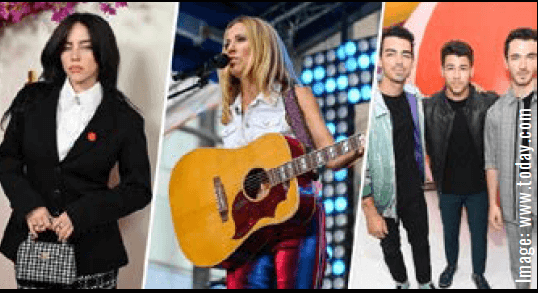 Last week, nonprofit musician advocacy
group Artist Rights Alliance
posted an open letter on Medium pleading
with AI companies to not use the
technology to devalue their music.
“Unchecked, AI will set in motion a
race to the bottom that will degrade the
value of our work and prevent us from
being fairly compensated for it,” says
the letter. It’s signed by over 200 big
hitters in the music industry, including
Billie Eilish, Smokey Robinson, Kacey
Musgraves, Elvis Costello, Katy Perry,
and even the estate of Frank Sinatra,
whose voice has been a ubiquity in the
“AI generated covers” trend.
Universal Music Group also took a
swing against AI earlier this year when
it pulled its entire catalog off of TikTok.
UMG’s open letter touted similar themes,
explaining how the platform is allowing
AI-generated content to “massively
dilute the royalty pool for human artists,
in a move that is nothing short of sponsoring
artist replacement by AI.” ...
As the music industry scrambles to
find solutions, OpenAI just announced
a tool that can create a replica of a human
voice.
Read full text:
Last week, nonprofit musician advocacy
group Artist Rights Alliance
posted an open letter on Medium pleading
with AI companies to not use the
technology to devalue their music.
“Unchecked, AI will set in motion a
race to the bottom that will degrade the
value of our work and prevent us from
being fairly compensated for it,” says
the letter. It’s signed by over 200 big
hitters in the music industry, including
Billie Eilish, Smokey Robinson, Kacey
Musgraves, Elvis Costello, Katy Perry,
and even the estate of Frank Sinatra,
whose voice has been a ubiquity in the
“AI generated covers” trend.
Universal Music Group also took a
swing against AI earlier this year when
it pulled its entire catalog off of TikTok.
UMG’s open letter touted similar themes,
explaining how the platform is allowing
AI-generated content to “massively
dilute the royalty pool for human artists,
in a move that is nothing short of sponsoring
artist replacement by AI.” ...
As the music industry scrambles to
find solutions, OpenAI just announced
a tool that can create a replica of a human
voice.
Read full text:
 Established in 2006, Polypiù is a family
business dedicated to innovation
in the construction industry for over
four decades. The company engages
closely with designers and installers of
skylights and industrial coverings, dedicating
comprehensive resources towards
practical, effective solutions.
They utilize polycarbonate, an adaptable
material perfect for various uses.
Polycarbonate is a sophisticated polymer,
consisting of numerous molecular
groups linked in a chain through
repeated covalent bonds. Specifically,
polycarbonate is produced from carbonic
acid and a chemical group from Bisphenol.
There are compact and multiwall
variants of polycarbonates. Within interior
design, polycarbonate facilitates the
partitioning of spaces without resorting
to construction. Additionally, it allows for the customization of panels through
coloring and/or decorating. ...
“Polycarbonate honeycomb systems
are innovative modular structures designed
for various applications including
industrial glazing and windows.
These systems are designed to be costeffective
with high light transmission,
good thermal insulation properties, and
an attractive aesthetic finish without
the need for connection profiles. They
are complemented by framing profiles
and finishing accessories to meet
diverse construction needs.
These structures are used in diverse
construction contexts, including
industrial windows and glazing,
curtain walls, roofs, and modular
systems for both commercial and civil
projects. ...
Read full text
Established in 2006, Polypiù is a family
business dedicated to innovation
in the construction industry for over
four decades. The company engages
closely with designers and installers of
skylights and industrial coverings, dedicating
comprehensive resources towards
practical, effective solutions.
They utilize polycarbonate, an adaptable
material perfect for various uses.
Polycarbonate is a sophisticated polymer,
consisting of numerous molecular
groups linked in a chain through
repeated covalent bonds. Specifically,
polycarbonate is produced from carbonic
acid and a chemical group from Bisphenol.
There are compact and multiwall
variants of polycarbonates. Within interior
design, polycarbonate facilitates the
partitioning of spaces without resorting
to construction. Additionally, it allows for the customization of panels through
coloring and/or decorating. ...
“Polycarbonate honeycomb systems
are innovative modular structures designed
for various applications including
industrial glazing and windows.
These systems are designed to be costeffective
with high light transmission,
good thermal insulation properties, and
an attractive aesthetic finish without
the need for connection profiles. They
are complemented by framing profiles
and finishing accessories to meet
diverse construction needs.
These structures are used in diverse
construction contexts, including
industrial windows and glazing,
curtain walls, roofs, and modular
systems for both commercial and civil
projects. ...
Read full text
 To avoid bad design in general,
and even more so when it comes
to people living with disabilities, it
is critical to recruit a representative
group of the people you want to design
for. And, in fact, not design for them
but design with them. This is the best
and fastest way to check if you are on
the right track.
It takes a two-minute discussion
with even a small group of people living
with accessibility needs to understand
that one-size-fits-all does not
work. There are too many different
and complex conditions and challenges
to cover.
Investing massively to find the perfect
product that works for everyone
and then mass-producing it could take
an eternity and might never work. So
why not embrace the ever-improving
possibilities offered by online customisation,
3D printing or other emerging
technologies? ...
Read full text
To avoid bad design in general,
and even more so when it comes
to people living with disabilities, it
is critical to recruit a representative
group of the people you want to design
for. And, in fact, not design for them
but design with them. This is the best
and fastest way to check if you are on
the right track.
It takes a two-minute discussion
with even a small group of people living
with accessibility needs to understand
that one-size-fits-all does not
work. There are too many different
and complex conditions and challenges
to cover.
Investing massively to find the perfect
product that works for everyone
and then mass-producing it could take
an eternity and might never work. So
why not embrace the ever-improving
possibilities offered by online customisation,
3D printing or other emerging
technologies? ...
Read full text
 Every spring, people start flocking to
Neelima Tummala’s ear, nose and
throat clinic. They seek remedies for
sinus infections, a scratchy throat and
other pollen-induced allergy symptoms.
And over the past several years, many
have complained that their hay fever
symptoms are worsening and lasting
many weeks longer than they used to.
The likely culprit, Tummala says, is
climate change.
As fossil-fuel burning continues
to flood the atmosphere with carbon
dioxide and other greenhouse gases,
driving up average global temperatures,
the planet’s seasons are also shifting. ...
With toasty temperatures dominating
more of the year, pollen and other seasonal
allergens can flourish, exacerbating
symptoms for the 26% of adults and 19% of children in the US who experience
them. “The prevalence of allergic rhinitis
has increased each year over the past
decades,” says Tummala, who practices
in the Division of Otolaryngology at the
George Washington School of Medicine
and Health Sciences ...
Climate change could be altering US
pollen patterns by lengthening the country’s
“frost-free” season, the period between
the final 32ºF reading of the year
in the spring and the first 32ºF reading in
the fall. During this time, plants are able
to produce blossoms and sprouts without
risk of frost damage and can welcome
honeybees and other pollinators to collect
nectar and distribute pollen. ...
Read full text
Every spring, people start flocking to
Neelima Tummala’s ear, nose and
throat clinic. They seek remedies for
sinus infections, a scratchy throat and
other pollen-induced allergy symptoms.
And over the past several years, many
have complained that their hay fever
symptoms are worsening and lasting
many weeks longer than they used to.
The likely culprit, Tummala says, is
climate change.
As fossil-fuel burning continues
to flood the atmosphere with carbon
dioxide and other greenhouse gases,
driving up average global temperatures,
the planet’s seasons are also shifting. ...
With toasty temperatures dominating
more of the year, pollen and other seasonal
allergens can flourish, exacerbating
symptoms for the 26% of adults and 19% of children in the US who experience
them. “The prevalence of allergic rhinitis
has increased each year over the past
decades,” says Tummala, who practices
in the Division of Otolaryngology at the
George Washington School of Medicine
and Health Sciences ...
Climate change could be altering US
pollen patterns by lengthening the country’s
“frost-free” season, the period between
the final 32ºF reading of the year
in the spring and the first 32ºF reading in
the fall. During this time, plants are able
to produce blossoms and sprouts without
risk of frost damage and can welcome
honeybees and other pollinators to collect
nectar and distribute pollen. ...
Read full text
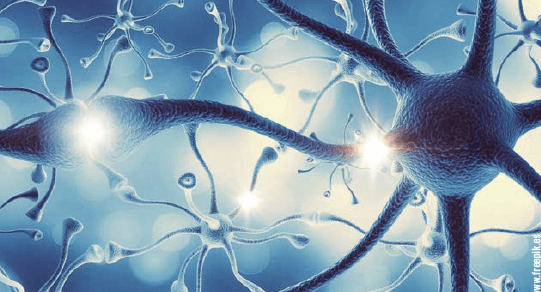 Researchers at Dartmouth have led a
study that looks into how the brain
regulates emotions. Published in Nature
Neuroscience, this study shows the intricate
mechanisms behind our emotional
responses and how we manage them.
Lead author Ke Bo, a postdoctoral researcher
at Dartmouth’s Cognitive and
Affective Neuroscience Lab, explains the
excitement of uncovering brain regions
solely dedicated to regulating emotions.
These findings offer new insight into
the inner workings of our minds and
could change clinical applications for
mental health treatments. This study
suggests targeting specific brain regions
for stimulation to enhance regulations.
Researchers used computational
methods to analyse participants’ brain
activity exposed to emotionally charged images. They discovered distinct areas
responsible for emotion regulation,
shedding light on how we navigate and
cope with negative experiences.
The study shows the role of the
anterior prefrontal cortex and other
higher-level cortical regions in emotion
regulation. These brain regions,
involved in abstract thinking and
long-term planning, play a vital role in
reframing our perceptions of challenging
situations.
The study also explores the influence
of neurotransmitters like dopamine,
serotonin, and cannabinoids on emotion
regulation. These chemicals, which
shape neural communication, were
found to interact with the brain’s emotion
regulation systems. ...
Read full text:
Researchers at Dartmouth have led a
study that looks into how the brain
regulates emotions. Published in Nature
Neuroscience, this study shows the intricate
mechanisms behind our emotional
responses and how we manage them.
Lead author Ke Bo, a postdoctoral researcher
at Dartmouth’s Cognitive and
Affective Neuroscience Lab, explains the
excitement of uncovering brain regions
solely dedicated to regulating emotions.
These findings offer new insight into
the inner workings of our minds and
could change clinical applications for
mental health treatments. This study
suggests targeting specific brain regions
for stimulation to enhance regulations.
Researchers used computational
methods to analyse participants’ brain
activity exposed to emotionally charged images. They discovered distinct areas
responsible for emotion regulation,
shedding light on how we navigate and
cope with negative experiences.
The study shows the role of the
anterior prefrontal cortex and other
higher-level cortical regions in emotion
regulation. These brain regions,
involved in abstract thinking and
long-term planning, play a vital role in
reframing our perceptions of challenging
situations.
The study also explores the influence
of neurotransmitters like dopamine,
serotonin, and cannabinoids on emotion
regulation. These chemicals, which
shape neural communication, were
found to interact with the brain’s emotion
regulation systems. ...
Read full text:
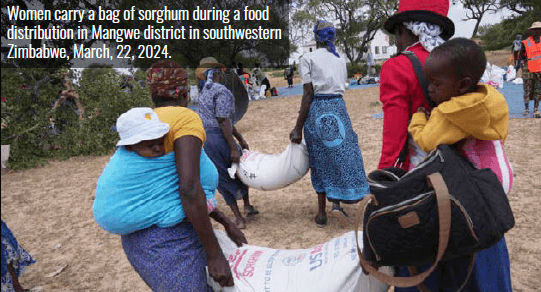 Zimbabwe declared a state of
disaster April 3, over a devastating
drought that’s sweeping across
much of southern Africa. The country’s
president declared it needs $2 billion
for humanitarian assistance. “Due to
the El Niño-induced drought … more
than 80% of our country received below
normal rainfall,” President Emmerson
Mnangagwa said in a speech calling
for international aid. The country’s
top priority, he said, is “securing food
for all Zimbabweans. No Zimbabwean
must succumb to, or die from hunger.”
He appealed to United Nations
agencies, local businesses, and faith
organizations to contribute towards
humanitarian assistance.
El Niño, a naturally occurring climatic
phenomenon that warms parts
of the Pacific Ocean every two to seven
years, has varied effects on the world’s
weather. In southern Africa, it typically
causes below-average rainfall, but
this year has seen the worst drought in
decades. In Zimbabwe, the United Nations’
World Food Program has already
rolled out a food assistance program
targeting approximately 2.7 million
people, nearly 20% of the country’s
population, from January to March.
Zimbabwe, once a regional agricultural
powerhouse and grain exporter,
has in recent years relied more and
more on aid agencies to avert mass
hunger due to extreme weather conditions
such as heat waves and floods. ...
Read full text:
Zimbabwe declared a state of
disaster April 3, over a devastating
drought that’s sweeping across
much of southern Africa. The country’s
president declared it needs $2 billion
for humanitarian assistance. “Due to
the El Niño-induced drought … more
than 80% of our country received below
normal rainfall,” President Emmerson
Mnangagwa said in a speech calling
for international aid. The country’s
top priority, he said, is “securing food
for all Zimbabweans. No Zimbabwean
must succumb to, or die from hunger.”
He appealed to United Nations
agencies, local businesses, and faith
organizations to contribute towards
humanitarian assistance.
El Niño, a naturally occurring climatic
phenomenon that warms parts
of the Pacific Ocean every two to seven
years, has varied effects on the world’s
weather. In southern Africa, it typically
causes below-average rainfall, but
this year has seen the worst drought in
decades. In Zimbabwe, the United Nations’
World Food Program has already
rolled out a food assistance program
targeting approximately 2.7 million
people, nearly 20% of the country’s
population, from January to March.
Zimbabwe, once a regional agricultural
powerhouse and grain exporter,
has in recent years relied more and
more on aid agencies to avert mass
hunger due to extreme weather conditions
such as heat waves and floods. ...
Read full text:
 Bloated and distorted carcasses
shimmered on the surface of Lake
Ambavarano in southeastern Madagascar.
Forty-year-old fisherman Olivier
Randimbisoa lost count as they floated
by. “I’d never seen anything like this”
he said. ... As Randimbisoa paddled
around in his canoe, he recognized the
species and called them by their local
names. Overnight, the fish he made
his living from, the fish that supported
the entire lakeside community, were
nearly gone.
“It was scary, because we have been
eating fish from this lake for so long,
and now it’s polluted,” said Randimbisoa.
“We have told our families not to
go to the lake.” He has a theory about
what killed the fish. “It’s dirty water
from the factory of QMM,” he said. Lake Ambavarano is connected
to two other lakes —Besaroy and
Lanirano— through a series of narrow
waterways. The lakes are adjacent
to QIT Madagascar Minerals, or
QMM: a mine in Madagascar that’s
80% owned by the Anglo-Australian
mining and metals behemoth Rio
Tinto, and 20% by the government
of Madagascar. The mine extracts
ilmenite, a major source of titanium
dioxide, which is mainly used as a
white pigment in products like paints,
plastics, and paper. QMM also produces
monazite, a mineral that contains
highly sought-after rare-earth elements
used to produce the magnets
in electric vehicles and wind turbines.
...
Read full text:
Bloated and distorted carcasses
shimmered on the surface of Lake
Ambavarano in southeastern Madagascar.
Forty-year-old fisherman Olivier
Randimbisoa lost count as they floated
by. “I’d never seen anything like this”
he said. ... As Randimbisoa paddled
around in his canoe, he recognized the
species and called them by their local
names. Overnight, the fish he made
his living from, the fish that supported
the entire lakeside community, were
nearly gone.
“It was scary, because we have been
eating fish from this lake for so long,
and now it’s polluted,” said Randimbisoa.
“We have told our families not to
go to the lake.” He has a theory about
what killed the fish. “It’s dirty water
from the factory of QMM,” he said. Lake Ambavarano is connected
to two other lakes —Besaroy and
Lanirano— through a series of narrow
waterways. The lakes are adjacent
to QIT Madagascar Minerals, or
QMM: a mine in Madagascar that’s
80% owned by the Anglo-Australian
mining and metals behemoth Rio
Tinto, and 20% by the government
of Madagascar. The mine extracts
ilmenite, a major source of titanium
dioxide, which is mainly used as a
white pigment in products like paints,
plastics, and paper. QMM also produces
monazite, a mineral that contains
highly sought-after rare-earth elements
used to produce the magnets
in electric vehicles and wind turbines.
...
Read full text:
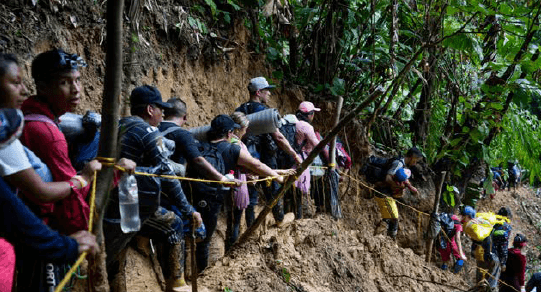 Over half a million people crossed
the Darién Gap [a swampy jungle
at the Colombia-Panama border] in
2023, often heading to the United
States. During their journey through
this difficult terrain, Venezuelans,
Haitians, and Ecuadorians, as well
as people from Asia and Africa, have
experienced serious abuses, including
sexual violence. Dozens, if not
hundreds, have lost their lives or gone
missing trying to cross. Many have
never been found.
Human Rights Watch (HRW) visited
the Darién Gap four times between
April 2022 and June 2023 and
interviewed almost 300 people. HRW
documented why migrants and asylum
seekers flee their own countries and
are reluctant to stay in other countries
in South America; how criminal groups
abuse and exploit them on the way; and
where Colombia’s and Panama’s policies
fall short in assisting, protecting,
and investigating abuses against them.
This report focuses on Colombia’s
and Panama’s responses to migration
across their border. It identifies specific
shortcomings in their efforts to protect
and assist these people —including
those at higher risk, such as unaccompanied
children— as well as to investigate
abuses against them. The report
provides concrete recommendations
to the governments of Colombia and
Panama on how to address these shortcomings
and to donor governments,
the United Nations and regional bodies,
and humanitarian organizations on how
to support and cooperate ...
Read full text:
Over half a million people crossed
the Darién Gap [a swampy jungle
at the Colombia-Panama border] in
2023, often heading to the United
States. During their journey through
this difficult terrain, Venezuelans,
Haitians, and Ecuadorians, as well
as people from Asia and Africa, have
experienced serious abuses, including
sexual violence. Dozens, if not
hundreds, have lost their lives or gone
missing trying to cross. Many have
never been found.
Human Rights Watch (HRW) visited
the Darién Gap four times between
April 2022 and June 2023 and
interviewed almost 300 people. HRW
documented why migrants and asylum
seekers flee their own countries and
are reluctant to stay in other countries
in South America; how criminal groups
abuse and exploit them on the way; and
where Colombia’s and Panama’s policies
fall short in assisting, protecting,
and investigating abuses against them.
This report focuses on Colombia’s
and Panama’s responses to migration
across their border. It identifies specific
shortcomings in their efforts to protect
and assist these people —including
those at higher risk, such as unaccompanied
children— as well as to investigate
abuses against them. The report
provides concrete recommendations
to the governments of Colombia and
Panama on how to address these shortcomings
and to donor governments,
the United Nations and regional bodies,
and humanitarian organizations on how
to support and cooperate ...
Read full text:
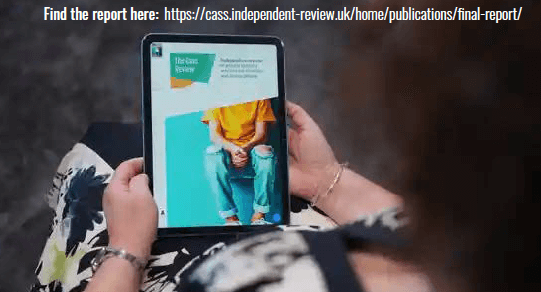 In the autumn of 2019, leading
consultant paediatrician Hilary Cass
agreed to conduct a review of international
research into puberty blockers
for NHS England. She expected it to be a
short, straightforward task. ...
Cass’s review is written in a calmly
clinical tone but there are moments
when her anger about how NHS England
has cared for a generation of vulnerable
children is barely disguised. Clinicians
have become “fearful”. The available
evidence is “poor”. Her efforts to conduct
a vital and comprehensive study
into the outcomes of all 9,000 children
and adolescents treated at the Tavistock
and Portman gender identity development
service (Gids) clinic between 2009
and 2020 were “thwarted”.
Cass knows her recommendations
will be hugely controversial and that some children waiting for treatment
will be dismayed by her conclusions
but she is adamant that she has young
people’s best interests at heart.
“We’ve let them down because the
research isn’t good enough and we
haven’t got good data,” she said.
The scope of her review is huge; she
has set out to review all the available
evidence on which gender medicine has
been based globally, as well as trying
to answer the puzzling question of
why the numbers of children seeking
referrals to gender clinics in the UK and
in other developed countries began an
exponential rise in around 2014, and
why so many more girls began seeking
treatment. (In 2011-12 there were just
under 250 referrals ...
In the autumn of 2019, leading
consultant paediatrician Hilary Cass
agreed to conduct a review of international
research into puberty blockers
for NHS England. She expected it to be a
short, straightforward task. ...
Cass’s review is written in a calmly
clinical tone but there are moments
when her anger about how NHS England
has cared for a generation of vulnerable
children is barely disguised. Clinicians
have become “fearful”. The available
evidence is “poor”. Her efforts to conduct
a vital and comprehensive study
into the outcomes of all 9,000 children
and adolescents treated at the Tavistock
and Portman gender identity development
service (Gids) clinic between 2009
and 2020 were “thwarted”.
Cass knows her recommendations
will be hugely controversial and that some children waiting for treatment
will be dismayed by her conclusions
but she is adamant that she has young
people’s best interests at heart.
“We’ve let them down because the
research isn’t good enough and we
haven’t got good data,” she said.
The scope of her review is huge; she
has set out to review all the available
evidence on which gender medicine has
been based globally, as well as trying
to answer the puzzling question of
why the numbers of children seeking
referrals to gender clinics in the UK and
in other developed countries began an
exponential rise in around 2014, and
why so many more girls began seeking
treatment. (In 2011-12 there were just
under 250 referrals ...
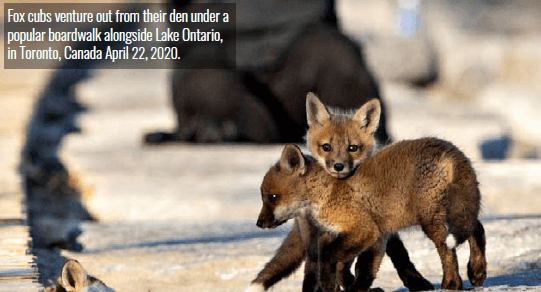 In the early days of the pandemic,
the Internet was rife with tales of
nature reclaiming the world as humans
were confined to their homes. ... But
it turns out this quieting of the human
presence on the planet —the “anthropause”
as scientists called it— didn’t
just turn into a coming-out party for
wildlife. Different types of animals
reacted very differently, according to
research published this month. Some
animals proved relatively unfazed,
while others shifted their behavior
significantly as nearby human activity
waxed and waned. ...
To capitalize on the moment, a group
of scientists contacted researchers who
were using motion-triggered cameras
to monitor mammal movements both
before and during the lockdowns. The observations covered everything from
hulking polar bears to diminutive cottontail
rabbits. Most came from North
America and Europe, though a smattering
of studies originated in Latin
America, Africa and Asia. ... In forests,
meadows and other less-developed
areas, animals generally moved around
less when humans were more active
(like the other animals, human
movements were gauged by how often
they were captured by the cameras).
The mammals’ appearance in photos
fell by 6% as human activity rose, the
scientists reported in Nature Ecology &
Evolution. The effect was greatest for
carnivores such as wolverines, wolves
and cougars. ...
In the early days of the pandemic,
the Internet was rife with tales of
nature reclaiming the world as humans
were confined to their homes. ... But
it turns out this quieting of the human
presence on the planet —the “anthropause”
as scientists called it— didn’t
just turn into a coming-out party for
wildlife. Different types of animals
reacted very differently, according to
research published this month. Some
animals proved relatively unfazed,
while others shifted their behavior
significantly as nearby human activity
waxed and waned. ...
To capitalize on the moment, a group
of scientists contacted researchers who
were using motion-triggered cameras
to monitor mammal movements both
before and during the lockdowns. The observations covered everything from
hulking polar bears to diminutive cottontail
rabbits. Most came from North
America and Europe, though a smattering
of studies originated in Latin
America, Africa and Asia. ... In forests,
meadows and other less-developed
areas, animals generally moved around
less when humans were more active
(like the other animals, human
movements were gauged by how often
they were captured by the cameras).
The mammals’ appearance in photos
fell by 6% as human activity rose, the
scientists reported in Nature Ecology &
Evolution. The effect was greatest for
carnivores such as wolverines, wolves
and cougars. ...
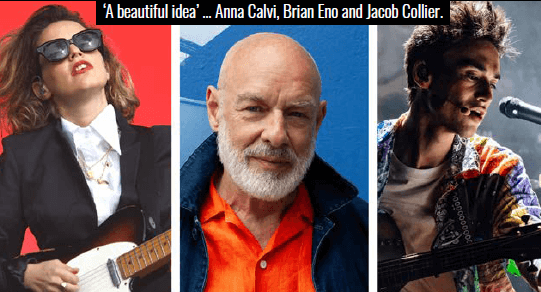 Musicians including Brian Eno are
to name the Earth as a co-writer
of their music, in order to divert a portion
of their royalties towards environmental
activism.
Described as “a poetic construct …
a beautiful idea” by Eno, the likes of
Dave and Stormzy producer Fraser
T Smith and multiple Grammy winner
Jacob Collier will add the Earth to
the credits of a forthcoming song or
composition. A royalties percentage of
their choice will be given in perpetuity
to EarthPercent, a charity of which
Eno is a founder and trustee, that raises
money from the music industry to fund
environmental activism.
Smith hailed it as “a brilliant initiative
… adding the Earth as a beneficiary
on projects is not only a choice
but a necessity”. Rostam Batmanglij, formerly of Vampire Weekend and
now an acclaimed solo artist, hailed
the scheme as “an intelligent use of
the income our intellectual property
generates”.
Other musicians joining the scheme
include Anna Calvi, Mount Kimbie,
Erland Cooper and Aurora. Aurora said:
“I am currently writing my next album
—it’s an album about interconnectedness
and the art of coexistence. There
is no greater teacher than Mother
Earth. There is no greater home, or
provider. There is no better place than
Earth. And that is why I want to make
this whole album with Mother Earth as
a co-writer, because without her there
wouldn’t be any such thing as music.”
... Read full text:
Musicians including Brian Eno are
to name the Earth as a co-writer
of their music, in order to divert a portion
of their royalties towards environmental
activism.
Described as “a poetic construct …
a beautiful idea” by Eno, the likes of
Dave and Stormzy producer Fraser
T Smith and multiple Grammy winner
Jacob Collier will add the Earth to
the credits of a forthcoming song or
composition. A royalties percentage of
their choice will be given in perpetuity
to EarthPercent, a charity of which
Eno is a founder and trustee, that raises
money from the music industry to fund
environmental activism.
Smith hailed it as “a brilliant initiative
… adding the Earth as a beneficiary
on projects is not only a choice
but a necessity”. Rostam Batmanglij, formerly of Vampire Weekend and
now an acclaimed solo artist, hailed
the scheme as “an intelligent use of
the income our intellectual property
generates”.
Other musicians joining the scheme
include Anna Calvi, Mount Kimbie,
Erland Cooper and Aurora. Aurora said:
“I am currently writing my next album
—it’s an album about interconnectedness
and the art of coexistence. There
is no greater teacher than Mother
Earth. There is no greater home, or
provider. There is no better place than
Earth. And that is why I want to make
this whole album with Mother Earth as
a co-writer, because without her there
wouldn’t be any such thing as music.”
... Read full text:
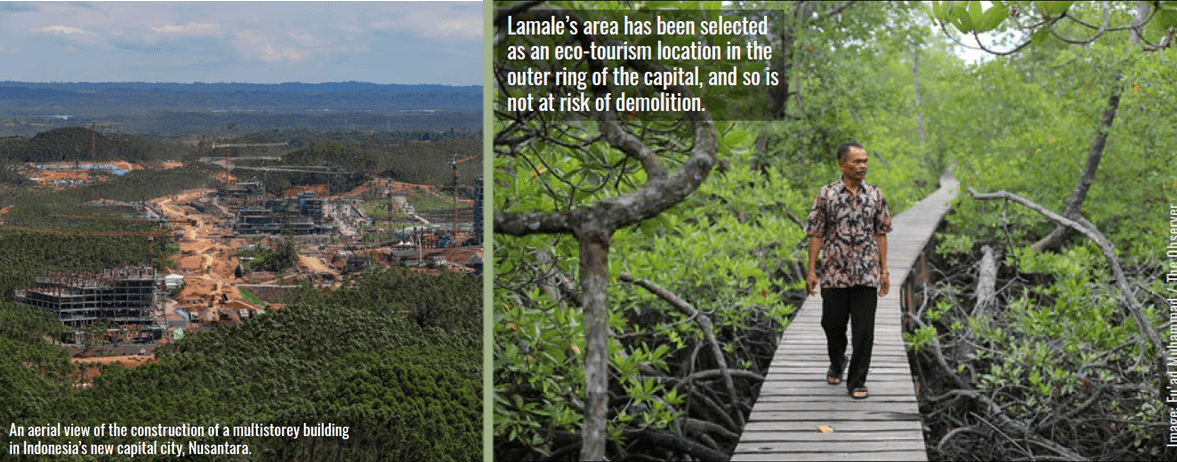
 Complementing
the original Scrabble on the same
two-in-one board, Scrabble Together
ditches the competitive edge, opting for a
team-based approach. playscrabble.com
Complementing
the original Scrabble on the same
two-in-one board, Scrabble Together
ditches the competitive edge, opting for a
team-based approach. playscrabble.com
 A solar-powered LED
lamp designed to deliver clean, affordable,
reliable light to the 1.6 billion
people worldwide without access to the
electrical grid. Five hours of charging
produces up to three hours of bright
light (plus additional hours of lower
light). By Olafur Eliasson and Frederik
Ottesen. store.moma.org
A solar-powered LED
lamp designed to deliver clean, affordable,
reliable light to the 1.6 billion
people worldwide without access to the
electrical grid. Five hours of charging
produces up to three hours of bright
light (plus additional hours of lower
light). By Olafur Eliasson and Frederik
Ottesen. store.moma.org
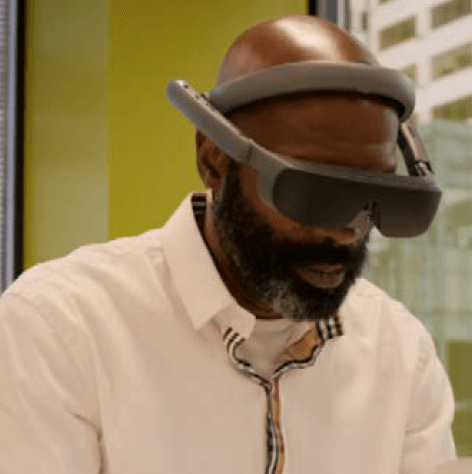
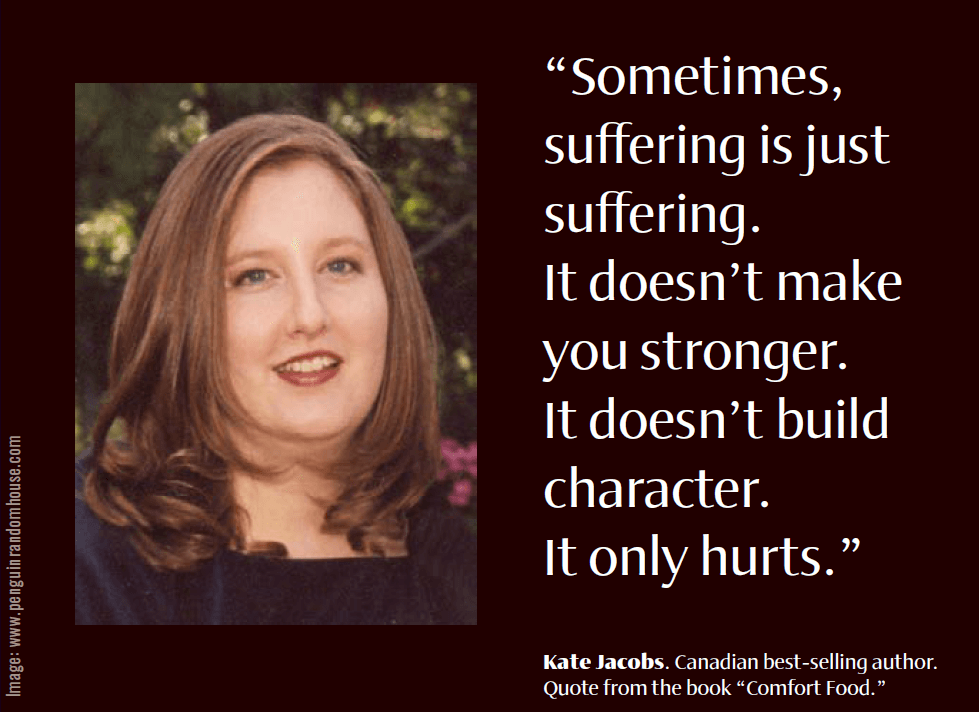

 The Bachelor of Transportation
Management and Logistics (BSc,
BTM) program helps students to understand
the principles, management,
economics, finances, and other issues
associated with the global air, maritime,
logistics, and transportation systems
of the world by providing them
with tools necessary to learn of the
cutting-edge processes, companies,
and standards associated with transportation,
logistics and supply chain
management. The Bachelor of Transportation
Management and Logistics
program is offered online via distance
learning. After evaluating both
academic record and life experience,
AIU staff working in conjunction
with Faculty and Academic Advisors
will assist students in setting up a
custom-made program, designed on
an individual basis. This flexibility to
meet student needs is seldom found
in other distance learning programs.
Our online program does not require
all students to take the same
subjects/courses, use the same books,
or learning materials. Instead, the
online Bachelor of Transportation
Management and Logistics curriculum
is designed individually by
the student and academic advisor. It
specifically addresses strengths and
weaknesses with respect to market
opportunities in the student’s major
and intended field of work. Understanding
that industry and geographic
factors should influence the content
of the curriculum instead of a standardized
one-fits-all design is the
hallmark of AIU’s unique approach
to adult education. This philosophy
addresses the dynamic and constantly
changing environment of working
professionals by helping adult students
in reaching their professional
and personal goals within the scope of
the degree program.
The Bachelor of Transportation
Management and Logistics (BSc,
BTM) program helps students to understand
the principles, management,
economics, finances, and other issues
associated with the global air, maritime,
logistics, and transportation systems
of the world by providing them
with tools necessary to learn of the
cutting-edge processes, companies,
and standards associated with transportation,
logistics and supply chain
management. The Bachelor of Transportation
Management and Logistics
program is offered online via distance
learning. After evaluating both
academic record and life experience,
AIU staff working in conjunction
with Faculty and Academic Advisors
will assist students in setting up a
custom-made program, designed on
an individual basis. This flexibility to
meet student needs is seldom found
in other distance learning programs.
Our online program does not require
all students to take the same
subjects/courses, use the same books,
or learning materials. Instead, the
online Bachelor of Transportation
Management and Logistics curriculum
is designed individually by
the student and academic advisor. It
specifically addresses strengths and
weaknesses with respect to market
opportunities in the student’s major
and intended field of work. Understanding
that industry and geographic
factors should influence the content
of the curriculum instead of a standardized
one-fits-all design is the
hallmark of AIU’s unique approach
to adult education. This philosophy
addresses the dynamic and constantly
changing environment of working
professionals by helping adult students
in reaching their professional
and personal goals within the scope of
the degree program.
 Atlantic International University is accredited by the Accreditation Service for International
Schools, Colleges and Universities (ASIC). ASIC Accreditation is an internationally
renowned quality standard for colleges and universities. Visit ASIC’s Directory of Accredited
Colleges and Universities. ASIC is a member of CHEA International Quality Group
(CIQG) in the USA, an approved accreditation body by the Ministerial Department of the Home Office
in the UK, and is listed in the International Directory of the Council for Higher Education Accreditation
(CHEA). The University is based in the United States and was established by corporate charter in 1998.
Atlantic International University is accredited by the Accreditation Service for International
Schools, Colleges and Universities (ASIC). ASIC Accreditation is an internationally
renowned quality standard for colleges and universities. Visit ASIC’s Directory of Accredited
Colleges and Universities. ASIC is a member of CHEA International Quality Group
(CIQG) in the USA, an approved accreditation body by the Ministerial Department of the Home Office
in the UK, and is listed in the International Directory of the Council for Higher Education Accreditation
(CHEA). The University is based in the United States and was established by corporate charter in 1998.
 In some cases, accredited colleges
may not accept for transfer courses and degrees
completed at unaccredited colleges, and some
employers may require an accredited degree as
a basis for eligibility for employment. Potential
students should consider how the above may affect
their interests, AIU respects the unique rules and
regulations of each country and does not seek to
influence the respective authorities. In the event
that a prospective student wishes to carry out any
government review or process in regards to his
university degree, we recommend that the requirements
of such are explored in detail with the relevant
authorities by the prospective student as the
university does not intervene in such processes.
AIU students can be found in over 180 countries,
they actively participate and volunteer
in their communities as part of their academic
program and have allocated thousands of service
hours to diverse causes and initiatives. AIU
programs follow the standards commonly used by
colleges and universities in the United States with
regards to the following: academic program
structure, degree issued, transcript, and
other graduation documents.
AIU graduation documents can include
an apostille and authentication from the
US Department of State to facilitate their
use internationally.
In some cases, accredited colleges
may not accept for transfer courses and degrees
completed at unaccredited colleges, and some
employers may require an accredited degree as
a basis for eligibility for employment. Potential
students should consider how the above may affect
their interests, AIU respects the unique rules and
regulations of each country and does not seek to
influence the respective authorities. In the event
that a prospective student wishes to carry out any
government review or process in regards to his
university degree, we recommend that the requirements
of such are explored in detail with the relevant
authorities by the prospective student as the
university does not intervene in such processes.
AIU students can be found in over 180 countries,
they actively participate and volunteer
in their communities as part of their academic
program and have allocated thousands of service
hours to diverse causes and initiatives. AIU
programs follow the standards commonly used by
colleges and universities in the United States with
regards to the following: academic program
structure, degree issued, transcript, and
other graduation documents.
AIU graduation documents can include
an apostille and authentication from the
US Department of State to facilitate their
use internationally.
| Dr. Franklin Valcin Presi den t/Academic Dean |
Dr. José Mercado Chief Executive Officer Chairman of the Board of Trustees |
Ricardo González, PhD Provost |
| Dr. Ricardo Gonzalez Chief Operation Officer and MKT Director |
Linda Collazo Logistics Coordinator |
AIU Tutors Coordinators: Deborah Rodriguez Amiakhor Ejaeta Amanda Gutierrez William Mora Miriam James Admissions Coordinators: Amalia Aldrett Sandra Garcia Junko Shimizu Veronica Amuz Alba Ochoa Jenis Garcia Judith Brown Chris Soto René Cordón Dr. Anderas Rissler Academic Coordinators: Dr. Adesida Oluwafemi Dr. Emmanuel Gbagu Dr. Lucia Gorea Dr. Edgar Colon Dr. Mario Rios Freddy Frejus Dr. Nilani Ljunggren De Silva Dr. Scott Wilson Dr. Mohammad Shaidul Islam |
| Dr. Miriam Garibaldi Vice provost for Research |
Carolina Valdes Human Resource Coordinator |
|
| Dr. Ofelia Miller Director of AIU |
Carlos Aponte Teleco mmunications Coordinator |
|
| Clara Margalef Director of Special Projects of AIU |
David Jung Corporate/Legal Counsel |
|
| Juan Pablo Moreno Director of Operations |
Bruce Kim Advisor/Consultant |
|
| Paula Viera Director of Intelligence Systems |
Thomas Kim Corporate/ Accounting Counsel |
|
| Felipe Gomez Design Director / IT Supervisor |
Maricela Esparza Administrative Coordinator |
|
| Kevin Moll Web Designer |
Chris Benjamin IT and Hosting Support |
|
| Daritza Ysla IT Coordinator |
Maria Pastrana Accounting Coordinator |
|
| Daritza Ysla IT Coordinator |
Roberto Aldrett Communications Coordinator |
|
| Nadeem Awan Chief Programming Officer |
Giovanni Castillo IT Support |
|
| Dr. Edward Lambert Academic Director |
Antonella Fonseca Quality Control & Data Analysis |
|
| Dr. Ariadna Romero Advisor Coordinator |
Adrián Varela Graphic Design |
|
| Jhanzaib Awan Senior Programmer |
Vanesa D’Angelo Content Writer |
|
| Leonardo Salas Human Resource Manager |
Jaime Rotlewicz Dean of Admissions |
|
| Benjamin Joseph IT and Technology Support |
Michael Phillips Registrar’s Office |
|
| Rosie Perez Finance Coordinator |
||
 The School of Business and Economics
allows aspiring and practicing
professionals, managers, and entrepreneurs
in the private and public sectors
to complete a self paced distance
learning degree program of the highest
academic standard.
The ultimate goal is to empower
learners and help them take advantage
of the enormous array of resources
from the world environment in order
to eliminate the current continuum of
poverty and limitations.
Degree programs are designed for
those students whose professional experience has been in business,
marketing, administration, economics,
finance and management.
The School of Business and Economics
allows aspiring and practicing
professionals, managers, and entrepreneurs
in the private and public sectors
to complete a self paced distance
learning degree program of the highest
academic standard.
The ultimate goal is to empower
learners and help them take advantage
of the enormous array of resources
from the world environment in order
to eliminate the current continuum of
poverty and limitations.
Degree programs are designed for
those students whose professional experience has been in business,
marketing, administration, economics,
finance and management.
 The School of Social and Human Studies
is focused on to the development of
studies which instill a core commitment
to building a society based on social and
economic justice and enhancing opportunities
for human well being.
The founding principles lie on the
basic right of education as outlined
in the Declaration of Human Rights.
We instill in our students a sense of
confidence and self reliance in their
ability to access the vast opportunities
available through information channels,
the world wide web, private, public,
nonprofit, and nongovernmental organizations in an ever expanding
global community.
Degree programs are aimed towards
those whose professional life has been
related to social and human behavior,
with the arts, or with cultural studies.
The School of Social and Human Studies
is focused on to the development of
studies which instill a core commitment
to building a society based on social and
economic justice and enhancing opportunities
for human well being.
The founding principles lie on the
basic right of education as outlined
in the Declaration of Human Rights.
We instill in our students a sense of
confidence and self reliance in their
ability to access the vast opportunities
available through information channels,
the world wide web, private, public,
nonprofit, and nongovernmental organizations in an ever expanding
global community.
Degree programs are aimed towards
those whose professional life has been
related to social and human behavior,
with the arts, or with cultural studies.
 The School of Science and Engineering
seeks to provide dynamic, integrated,
and challenging degree programs
designed for those whose experience
is in industrial research, scientific production,
engineering and the general
sciences. Our system for research and
education will keep us apace with the
twenty-first century reach scientific
advance in an environmentally and
ecologically responsible manner to allow
for the sustainability of the human
population. We will foster among our
students a demand for ethical behavior,
an appreciation for diversity, an understanding
of scientific investigation, knowledge of design innovation, a
critical appreciation for the importance
of technology and technological change
for the advancement of humanity.
The School of Science and Engineering
seeks to provide dynamic, integrated,
and challenging degree programs
designed for those whose experience
is in industrial research, scientific production,
engineering and the general
sciences. Our system for research and
education will keep us apace with the
twenty-first century reach scientific
advance in an environmentally and
ecologically responsible manner to allow
for the sustainability of the human
population. We will foster among our
students a demand for ethical behavior,
an appreciation for diversity, an understanding
of scientific investigation, knowledge of design innovation, a
critical appreciation for the importance
of technology and technological change
for the advancement of humanity.
 With access to a global catalog created and maintained collectively by more than
9,000 participating institutions, AIU students have secured excellent research
tools for their study programs.
With access to a global catalog created and maintained collectively by more than
9,000 participating institutions, AIU students have secured excellent research
tools for their study programs.